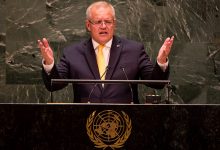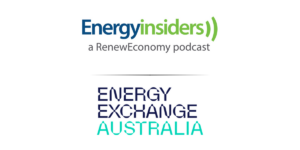Australian Prime Minister Scott Morrison has used his first major speech on the global stage to deflect criticism of the Australian Government’s lack of meaningful climate policies, using his address to the United Nations General Assembly to take credit for the progress being made in Australia that his own government has sought to stymie.
Morrison has faced ongoing criticism throughout his tour of the United States for his failure to engage on the issue of climate change, which has been a prominent focus of world leaders attending the meeting in New York.
In his speech overnight, Morrison argued that Australia is making a fair contribution to global action on climate change, and suggested that some a have sought to “facelessly exploit” the anxieties of young people over climate change to suit their own agendas.
However, it is not just young people who are anxious about climate change, and the anxieties are understandable when experts have been imploring governments to take action on climate change, or otherwise face severe consequences that will only worsen in the decades to come.
“Australia’s internal and global critics on climate change willingly overlook or perhaps ignore our achievements as the facts simply don’t fit the narrative they wish to project about our contribution,” Morrison told the United Nations General Assembly in New York.
In an effort to deflect criticism about his lack of leadership on climate action, Morrison spent the most time talking about Australian efforts to increase the rate of recycling, reducing plastics pollution and talking up the health of the Great Barrier Reef, claiming that it was “vibrant and resilient”.
However, this ignores the dire warnings of a new special report from the Intergovernmental Panel on Climate Change, that the world’s oceans have been bearing the burden of global warming and absorbing most of the world’s extra heat.
The report – a synthesis of the work of more than 100 academic research – concludes that many serious impacts are already inevitable, from more intense storms to melting permafrost and dwindling marine life, and far worse will occur without urgent action to cut fossil fuel emissions.
In an earlier report, the IPCC concluded that “coral reefs would decline by 70-90 per cent with global warming of 1.5°C, whereas virtually all (99 per cent) would be lost with 2°C.”
Even the Australian Defence Force chief Alistair Campbell warned this week that climate change could stretch the capability of the Australia defence force.
Yet, Morrison seems to think that young people are being misled about the threat posed by climate change.
“Like many leaders here, I get many letters from children in Australia concerned about their future. I take them very seriously and I deeply respect their concerns and indeed I welcome their passion, especially when it comes to the environment,” Morrison said in his speech.
“My impulse is always to seek to respond positively and to encourage them. To provide context, perspective and particularly to generate hope. To focus their minds and direct their energies to practical solutions and positive behaviour that will deliver enduring results for them.”
“We must guard against others who would seek to compound or, worse, facelessly exploit their anxiety for their own agendas. We must similarly not allow their concerns to be dismissed or diminished as this can also increase their anxiety.”
Morrison’s approach would seek to keep young people in the dark about the threats posed by climate change, to prevent them from becoming anxious about their futures.
Where are young people getting this information? From scientists, from experts, from researchers and from the academic institutions we entrust to find and communicate the reality of what is happening to our planet.
While young people are often an easy target, for dismissing their concerns as naïve and suggesting they would be better off focusing on their schooling. The reality is that young people are simply telling our politicians to listen to the experts.
Swedish climate activist Greta Thunberg effectively pre-empted the kind of speech Morrison would give to the United Nations General Assembly in her own address to the UN climate action summit.
“For more than 30 years, the science has been crystal clear. How dare you continue to look away and come here saying that you’re doing enough, when the politics and solutions needed are still nowhere in sight,” Thunberg said.
It is also hard to look past some of Morrison’s own conduct as Prime Minister as a cause for concern, given just this week he opted to visit both a box factory in Ohio, and a McDonalds drive-through in New York, rather than engage with a United Nations climate action summit.
Are positive things happening in Australia? Absolutely.
The action led by State, territory and local governments has underpinned the investment in renewable energy, energy storage and energy efficiency measures that have continued to drive emissions in the electricity sector lower.
Strong targets and strong investment from States like Victoria, South Australia and the ACT, along with the rapid rise of corporate power purchase agreements, have driven the expansion of large-scale renewable energy projects. All Australian states have adopted a target of achieving zero net emissions by 2050.
But the Abbott-Turnbull-Morrison Government cannot take credit for this action, following six years spent working to repeal the carbon price, reducing the renewable energy target, cutting funding to the Australian Renewable Energy Agency, and open advocacy for expanding the Australian coal sector.
It’s a government that has taken an openly hostile approach to renewable energy, at times labelling technologies as ugly, unreliable, expensive, and tokenistic.
Australia’s government has a growing international reputation as a country lead by climate change denialists, and a country that would rather promote its own coal and gas interests, than engage in genuine negotiations over climate change action.

The Morrison government’s position on the Kyoto targets, including an insistence that it will exceed the 2020 Kyoto commitments and carryover excess allowances into its 2030 Paris commitments won the backing of coal giant BHP.
But as stated by Vision Super chief investment officer Michael Wyrsch, a Kyoto credit carryover would undermine Australia’s 2030 Paris targets, and “effectively means you’re supporting a 10-12 percentage point reduction in Australia’s emissions targets.”
And the very existence of the “overhang” exists at all reflects the fact that Australia’s Kyoto targets allowed it to increase emissions rather than reduce them as other developed countries were required.
Morrison’s speech to the UN General Assembly made no mention of increases in greenhouse gas emissions that are occurring in the Australian economy beyond the electricity sector.
One definitive achievement of the Liberal Government is that they managed to reverse a nine-year long trend of falling national greenhouse emissions dating back to 2007.
These emissions increases have been driven as a result of Australia’s massive ramping up of fossil fuel exports, primarily natural gas, which despite claims from federal energy minister Angus Taylor, will only further Australia’s contribution to diminishing the global carbon budget needed to avoid the worst impacts of global warming.
This is not some source of fake news, or some misrepresentation by the media. This is the data released by the Australian Government.
Australia’s young people are likely justified to be suspicious of the actions of a Prime Minister who thought it was appropriate to brandish a piece of coal in the Australian parliament.
More than 300,000 people turned out to Climate Strike rallies across Australia earlier in September, inspired and coordinated by school students who organised their own climate strikes in March.











